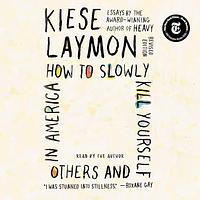Take a photo of a barcode or cover
Thoroughly enjoyed this short collection of essays, so much that I took my time reading each essay to prolong it ending. I love Nikki Giovanni and Kiese writes about growing up in Mississippi the way she writes about growing up in Knoxville and Cincinnati. The stories he share and the way he writes feels familiar, almost like I could switch out the names and locations (Arkansas instead of Mississippi) because I know the people in these essays and I've told similar stories of growing up Southern and spending time with my grandmothers, aunts, uncles, and cousins. And the infusion of hip-hop references throughout just made this collection perfect.
For a peak experience, read with Big K.R.I.T playing in the background!
My favorites from the collection: Da Art of Storytellin' (A Prequel), You Are the Second Person, and Hip-Hop Stole My Southern Black Boy.
For a peak experience, read with Big K.R.I.T playing in the background!
My favorites from the collection: Da Art of Storytellin' (A Prequel), You Are the Second Person, and Hip-Hop Stole My Southern Black Boy.
In this slim collection of essays, Mr. Laymon writes about coming up in Mississippi, race and how this shapes his and his family's life (both in Mississippi and Chicago), and how he dealt with being expelled from college for a trifling offense after having dealt with blatant racism on campus. His writing is raw, acerbic and unflinching, especially when he writes about his own reticence around providing assistance to some family members who have been unable to leave communities that provide them little in the way of opportunity. These essays will touch and challenge you as a reader.
Splendid
Fantastic voice and some very striking and excellent essays. Kiese is so connected to the pulse of society and turns a critical eye not just in America but also in himself . Both relatable and eye opening.
Fantastic voice and some very striking and excellent essays. Kiese is so connected to the pulse of society and turns a critical eye not just in America but also in himself . Both relatable and eye opening.
emotional
reflective
fast-paced
If you haven’t read Kiese then you just don’t understand. The sentences he creates are magical and you have to read them multiple times just to take it all in.
Reading Heavy in 2019 encouraged me to purchase this book and Long Division. When I like an author, I want to grab everything they have written and continue exploring their worlds, minds, and visions. I read this collection of personal essays in snippets. It felt like a meta text for Heavy, and was interesting to read it with that in mind. His perspective of the Black gaze gazing upon whiteness and the daily encounters with whiteness gives the contemporary literary canon an interesting Black autonomy that follows in the footsteps of Baldwin, Morrison, and Hurston. I cannot help but think about runaway enslaved posters and how the Black male is whittled down to descriptors with no sense of what they felt or understood about American society that was or to become within our shared past, present, and future. As a millennial reading this collection, it brought me back to pivotal childhood moments and helped me understand Gen X perspectives and moments in our shared past, such as the murder of Tupac and the rise of hip-hop from the South. As a child from Kentucky during those times, I appreciated a fellow Southern voice speaking about Southern autonomy, art forms, and creativity. As someone who tried to dip a toe into the world of agents and publishers who were told their work was too insular because it was about a southern Black boy, I appreciated the final essay. Because of it, I did not feel so alone in my experiences concerning gatekeeping in the publishing world and the denial of southern Black stories that would infiltrate "mainstream literature." I am still unpacking my overall take, and I imagine I will revisit some of the essays to re-read them and digest more. I am a massive fan of Laymon's letters to the deceased and family members, and I am happy that his genre-bending style has been added to the canon, whether understood or not. Having diverse voices is essential, significantly challenging what Black literary craft is and can become. I am glad that he did not give up on his vision and continued to seek the right home for his work no matter how wounding that journey can become. One criticism is that I feel as if he tells the same exact life experiences over and over again across many of his books and essays, but due to the trauma, rumination is a part of his style, and they are all so harrowing, to begin with, so how could you not?
There is something so interesting about this as well. So much food for thought.
There is something so interesting about this as well. So much food for thought.
I have read several essay collections in the last three years that share Laymon's subject matter, but none snuck up on me like this one. Laymon lays down some serious challenges (usually to himself first, then the audience), many of them about love.






